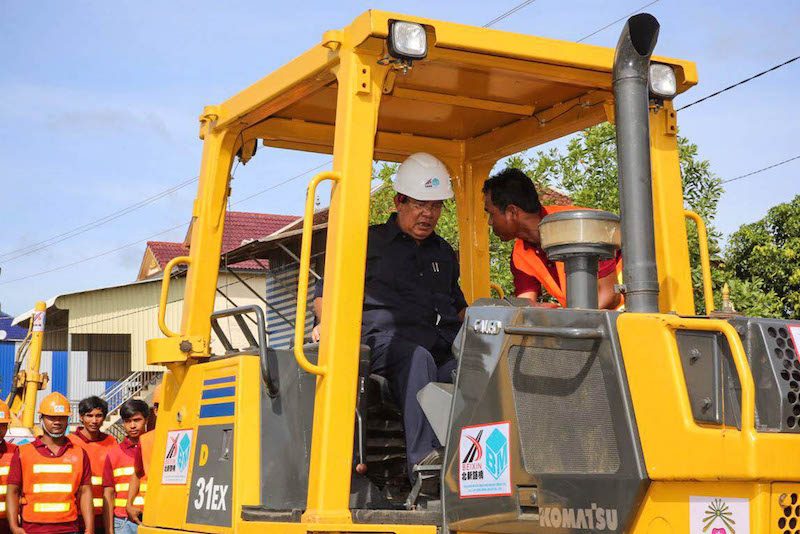Donning a hard hat and surrounded by workers wearing safety vests and mildly concerned expressions, Prime Minister Hun Sen took control of a canary-yellow earthmover on Wednesday to break ground on a $192 million, 1,200 km rural road building project.
“Let me emphasize that the infrastructure policy of mine and the CPP’s is the correct policy to develop and improve the country,” Mr. Hun Sen told attendees at the ceremony in Tbong Khmum province’s Kroch Chhmar district.

The event doubled as the opening of newly paved roads built during the first phase of the project, which has upgraded 543 km of red dirt roads to concrete in eight provinces since 2011.
Promises of roads and other infrastructure projects have long been entwined with the ruling party’s campaigning. Five months before the 2013 national elections, Mr. Hun Sen made a speech at the inauguration of an expansion of National Road 6A to say that a vote against the CPP would imperil road projects as well as the construction of pagodas and schools.
“All projects will be eliminated…. Even a project like pumping water to dry farms,” the prime minister said of what would happen if the CPP lost.
The first phase of the rural road building project, completed on Wednesday, cost $68.65 million with funding from the government, Asian Development Bank, the Nordic Development Bank and South Korea, Mr. Hun Sen said, adding that the upgrades spanned the provinces of Tbong Khmum, Kompong Cham, Kompong Thom, Siem Reap, Battambang, Pursat, Kompong Chhnang and Kompong Speu.
“When we have good roads, please do not drive too fast,” he warned on Wednesday.
It used to take an hour and a half to drive just 30 km on the old dirt roads, Mr. Hun Sen said, meaning farmers would now be able to reduce the costs of bringing their produce to market.
“Now it spreads—having paths developed as paved and concrete roads, ones that in the past we would have never thought or dreamed of being able to improve,” he said.
The second phase of the project will run through 2020 and cover 10 provinces, with funds coming from the government, providing $17.79 million; $54 million from the Asian Development Bank; $41 million from South Korea; $18.52 million from Australia ; as well as other funders, he said.
Correction: A previous version of this article incorrectly stated that the Rural Development Bank contributed funds for the rural road building project.